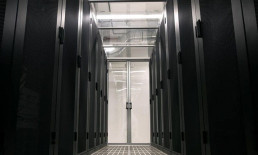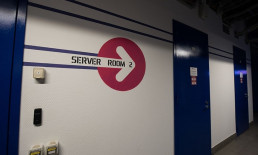You’ve noticed or had customer complaints that your application or website has been running slow. You have a reputable hosting provider, at least you thought you did, but you come to find out that you’re using shared hosting.
Apparently, there are other people within your server hogging all of the resources that you didn’t know you were sharing in the first place. Now your provider is recommending you buy a dedicated server to improve your site’s performance.
But what exactly is a dedicated server, and how does this compare with what you thought was working fine?

Dedicated Server Definition
A dedicated server is a computer set aside for a specific task, such as hosting a resource-intensive application or website. Dedicated servers can take several forms.
With a dedicated server, the server is a computer that is reserved explicitly on a network for your application or website.
For many web hosting companies, the standard type of hosting, or at least the lowest priced option, is in the form of cloud hosting. When your company chooses a public cloud provider, your application and website may reside on one or many computers and utilize cloud computing.
In a shared hosting solution, your website or app is vying for resources with an unknown number of other software applications. This creates a potential situation listed above where you start to experience slow-down or lag from someone else. These additional software applications and websites may use resources that your applications or site needs.
When speaking about dedicated servers with hosting companies, the service provider sets aside one server (or a single machine) to handle the workload the website or application requires. Managed servers give you access to your very own private cloud and give you the flexibility of cloud hosting but with your own resource center’s added security and speed.
In-House or Off-Site Servers?
In some cases, a dedicated server can be on-site at your place of business.
There are pluses and minuses to this type of solution.
The obvious benefit is that you have complete physical control of the hardware and who has access to it. This is extremely useful for companies that require the security of a closed computer network and a private cloud.
The security measures on these machines are often more stringent than those for companies that need website hosting. Companies that deal with financial data, medical records, or sensitive government regulated data are more likely to choose this option over companies that don’t require such measures.
The downside to having an in-house server is maintenance and scalability, especially if the machines are self-managed. Should you choose to go this route, you will regularly need to update your hardware and software, costing a company in time, resources, and money that could be utilized elsewhere. If you decide to outsource maintenance, there’s the problem of vetting technicians and ensuring that everything is completed to your satisfaction. You must also have a server room (or at least a place) that is appropriately climate and access controlled.
Backups and redundancy are something to consider with your own server.
If there is a problem with your data, if there is a catastrophic incident (hackers, disk failures, and natural catastrophes), or if there is a need for maintenance, you or your team are directly responsible for handling downtime. If your business requires that your servers be up and running 24/7, you will need to develop a plan to ensure that your applications or websites will still run when your primary server is down.
Off-site servers through a hosting company allow the application or web hosting company to provide a dedicated server but off-site, presumably at the hosting company’s data center. Companies most often rent these servers from hosting companies and have the hosting company handle the complexity of backups, redundancy, maintenance, and upgrades.

Dedicated Servers for Software As A Service (SaaS) Providers
Another business model that often utilizes dedicated servers is Software-as-a-Service (Saas), providers. By using the dedicated server as infrastructure to provide Software-as-a-Service products, companies can focus on their software rather than worry about infrastructure related concerns.
SaaS generally needs to be web accessible 24/7/365, so reliability is of vital importance. By leasing these types of servers from companies that are in the business of providing dedicated hardware, SaaS providers get a server that they can rely on. By allowing their provider to address any infrastructure related issues as they arise, they free up their technical staff’s valuable time to get back to doing what they do best—providing excellent software solutions for their customers. Many SaaS companies offer backups, support, and server management. Because dedicated servers can be rented rather than purchased outright, this option can provide an excellent way for small and medium-sized businesses to have the computing power of larger corporations.
SaaS providers often find it helpful to hybridize and use cloud resources as well. Administrators will often use the cloud to test out applications for software development and quality control before moving applications and websites over to dedicated servers.
Benefits to Dedicated Servers
There are many benefits to using dedicated servers.
The benefits include:
-
- Speed and agility. Your applications and websites have the advantage of being able to use all the resources on the server, without vying for resources with other applications.
- Security. You are less likely to have your programs and websites hacked because your sites and data reside outside of a public cloud and may be able to put into effect more security measure.
- Control. In some instances, a dedicated server (especially on site) allows more control over your hardware and software.
- Scalability. You can request more CPUs, more extensive networks, and more disk space if your applications require them. You can also upgrade to a faster and larger server that can handle the workload your websites and applications need.
- Customizable. Since you are renting or purchasing this server, you can have it set up any way you’d like.

Considerations with Dedicated Servers
When deciding on a dedicated hosting solution, you need to consider the following:
-
- Rent or Own Your Server? Depending on your needs, you may consider renting or owning a dedicated server. Renting gives you the ability to upgrade often seamlessly.
- Scalability. How many disks, processors, and network connections do you need up front and in the future? Knowing and understanding your needs will put you ahead when your business expands.
- On-Site or Off-Site? If you choose to keep the server in-house, you will have to have an appropriate place to house the server. It will need a climate controlled room with network connections. Who will administer the computers? Do you hire a third party to manage them or use someone in-house?

Should You Go With a Dedicated Server?
Dedicated servers, by nature, have actual hardware and software dedicated to a business’s application or website.
The question many business owners ask is if they should go with a dedicated server or if they should stay with cloud hosting? At first, many business owners opt for the cloud servers because of the attractive price. However, the choice becomes obvious when their applications and websites bog down due to heavy resource usage and high traffic. Often, they find themselves scrambling for better solutions when they should have chosen a dedicated server in the first place.
Businesses that have sensitive data or must comply with government regulations need to choose a dedicated server to decrease the potential risks to their data and possible loss of revenue and hefty fines. Any company that wants control over scalability and customization should consider using a dedicated business server over a cloud server.
In the long run, a dedicated server may prove to be advantageous to any business that works in E-commerce or requires agility on the web.
